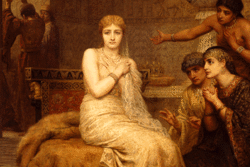Vashti's Story: A Midrash
Fabric collage by artist Anna J. Bearman. Find her work on Instagram. Image courtesy of the artist.
In the first chapter of Megillat Esther (the Book of Esther), we read about the life and downfall of the sitting queen of Shushan, Vashti. The Tanakh tells the story of Vashti’s refusal to allow her husband, the king, to “display” her beauty to his friends and courtiers. Her refusal is conveyed in just one line of narratorial text. In contrast, the next nine verses (which include several direct quotes from male figures) are dedicated to the king’s scheming with his advisors to ensure that other women do not follow Vashti’s example.
Unfortunately, the majority of the rabbinic tradition has focused on demonizing Vashti—sometimes quite literally—for refusing her husband’s command. However, in recent decades, Vashti has been reclaimed and celebrated by those who see her as a prototypical feminist. By those of us who admire her, she has been lifted up in the same way that Lilith has, as an ancient example of a woman who understood her worth and refused to bow to patriarchal tyranny.
In this Midrashic Monologue, we explore Vashti’s heart and mind, honoring both her heroism and her humanity. We hope you’ll agree that she is the queen we all deserve.
Interlopers
For seven days, my quarters were filled with the sounds of laughter and conversation. But all of that changed on the seventh day when my husband’s attendants strutted into my rooms. The moment that these men appeared, all of the women fell silent.
I looked around, noting that many of my guests were dressed as we often are when free from the eyes of men. Some had unbound their hair, while others had discarded the heavy wraps that they used to cover their bodies in public. I stood quickly, moving in front of the others and using my body to preserve their modesty. I addressed my husband’s men, speaking with authority, “Why have you come here? Can you not see that I am with my guests? You must leave immediately.”
One of the intruders took a step forward: Mehuman, my husband’s favored servant. He looked directly into my eyes, a brazen display of disrespect, and responded, “We have brought you a message from your king.”
Another of my husband’s attendants, Charcas, cleared his throat. “My queen, we apologize for this disturbance. As Mehuman said, we have come to deliver a message from King Ahashuerus. Once we have fulfilled this duty, we will leave immediately.”
I nodded at him. “You may deliver your message and then return to my husband’s chambers.”
A King’s Command
Charcas seemed to be struggling to share the words that he had been entrusted with. Finally, after what felt like an eternity, he spoke. “King Ahashuerus has invited you to visit his feast. He would like to introduce you to his honored guests.”
I was mystified by this request. I was no more permitted to attend my husband’s feast than these men were permitted to attend the women’s celebration. What would the kingdom think when they heard that I had been alone with so many men? How could Ahashuerus put me in such a compromising position?
Desperate to end this interchange, I decided to intentionally misunderstand Charcas’s words. “Please thank my husband for his invitation. I look forward to meeting his companions when we sit together in the throne room at the conclusion of our festivities.”
Again, Charcas appeared uncomfortable, but he accepted my answer. “Thank you, my queen. We will share your words with the king.”
Mehuman sneered and said in a mocking tone, “Actually, Charcas neglected to tell you the most important part of the king’s message.” He smiled in a way that made my stomach hurt. “He wants you to come tonight because he and his friends are bored and are in desperate need of entertainment. Oh, and he wants you to wear the crown that he gave you. In fact, he wants you to wear only the crown.”
Mehuman gestured to the other attendants, signalling that they should depart. As he passed me, Charcas whispered, “Majesty, the king and his friends are drunk and careless. They will hurt you and think nothing of it. I am sorry that I could not stop him from demanding your presence.”
And with that, my only ally walked away, shuffling silently behind the men who had, in delivering the king’s message, just sealed my destruction.
A Queen’s Retreat
The moment the door closed behind them, I began weeping, feeling devastated and afraid. My companions gathered tightly around me. They were like a phalanx of soldiers, protecting me while I was vulnerable, holding me, their wounded sister, at their center. Even as they grappled with their own fears, these remarkable women moved to shelter me.
When I saw their strength, their loyalty, I forced myself to stand, wiping my cheeks and smoothing my hair. I needed to answer my husband’s summons, and as I stood surrounded by my sisters, I knew what I would say to him: “No. I refuse to let you make me anything less than the queen that these women deserve.” I knew that delivering this response to my husband would be dangerous, and so I prepared to shoulder the responsibility myself.
Girding for Battle
“Friends,” I said quietly, and the moment the word left my lips, all eyes snapped to mine. “If my husband,” I sneered the word, “wishes to see me, then I will go to him. But, I refuse to be an object that he can use or a source of entertainment for his friends.
“Sisters, only a few years ago, many of you helped prepare me for my wedding to Ahashuerus. Today, I once again ask for your help—this time as I prepare for my liberty. While I do not know how this day will unfold, I can say with certainty that by nightfall I will be free of this man.”
For the next hour, the women, some of them lifelong friends and others sisters in circumstance, helped me dress in the only armor that was afforded to us. They girded my body with the soft veils women were commanded to wear and painted my face with the stark and menacing hues of a warrior.
My father’s sister came to me carrying the crown that Ahashuerus had demanded that I wear. It was a crude and heavy piece, the perfect representation of the burden Ahasuerus’s love had become.
My aunt placed the weighty crown on top of my intricate braids. Then she knelt in front of me and said, “Vashti, remember that you are the descendant of queens and kings. Within your spirit, you hold generations of power and might. Make this man understand who you are.”
Victorious and Redeemed
I nodded, rose carefully, and walked to my chamber door. Before I passed over the threshold and into the unknown, I turned and said, “Sisters, thank you for your support and your care. My husband’s message is a declaration of war against me and against all of us. I will answer it with all the power that I have at my disposal.
“I will go to him not as a seductress but as a wraith, a living embodiment of the grief, fear, passion, and anger that I know we all hold within our hearts. I hope to return to you, victorious and redeemed, but if I do not, if I can not, then I ask that you remember me.
“Tell your daughters of the woman who challenged the abuses of careless and cruel men. Tell your sons of the pain that we feel when people use their power to degrade us and to place our lives in jeopardy. Tell each generation about Vashti so that no other woman will find herself at the mercy of such destructive and evil men.”
I walked away from my sisters with my head held high. I did not know what awaited me, but I knew this:
I was Queen Vashti of Shushan, and I would forever be the queen my people deserve.
To read the full, unabridged version of this midrash, visit www.MidrashicMonologues.com.









Do you know the year Vashi married Xerxes? Was it before the Battle of Plataea? Was it before he fell in love with Masistas’ wife?